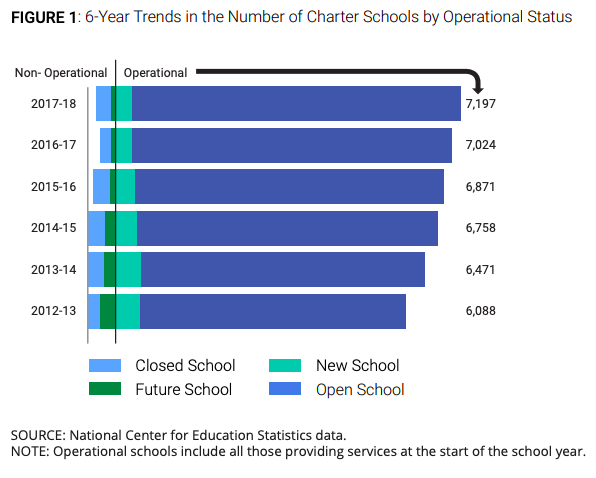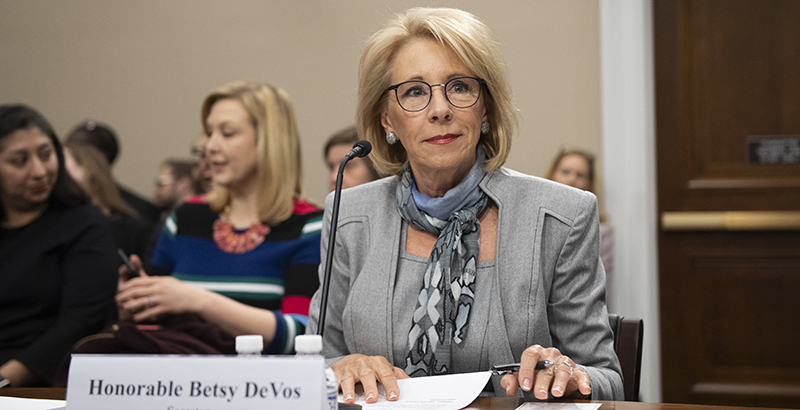If Betsy DeVos was feeling anything but ebullient at last week’s Conservative Political Action Conference, she didn’t show it.
The right’s premier annual conclave for networking and organizing, CPAC provides an opportunity for conservative luminaries to shape policy debates, lap up adulation from enthusiastic activists and spike rhetorical footballs in the face of the D.C. establishment.
DeVos did all three on Thursday, appearing onstage with White House advisor Kellyanne Conway to promote a new proposal to create a $5 billion tax-credit program that can be used to subsidize private school vouchers. The initiative, announced during President Trump’s State of the Union address, would become the president’s signature education accomplishment if enacted.
“It’s a real privilege to be serving President Trump and this administration, in advancing his goal of ensuring that every single child — no matter their family income, their zip code, any other factor — has an opportunity to access a great-quality education,” she announced, stopping for applause.
The reception stood in sunny contrast to the welcome DeVos received on Capitol Hill hours before, when she appeared before the House appropriations subcommittee that oversees her department’s budget. The secretary absorbed aggressive questioning from Democratic members over the education budget request, which would cut billions of dollars from the Department of Education and merge dozens of federal programs into a block grant to be disbursed to states. At one point, DeVos even found herself fending off a demand that she resign.
Though both the budget and voucher proposals are certain to founder amid congressional opposition, the administration’s attempted cuts have unsettled several initiatives with committed political constituencies, most prominently the federal Charter Schools Program. Stripping funds from that program, which has seeded thousands of public charter schools across the country, would be a consequential move — particularly when accompanied by the effort to forge ahead on private school choice.
Scott Sargrad, vice president of K-12 education policy at the liberal Center for American Progress, said that while the unwinding of CSP and other federal spending priorities was unlikely, the prospect remained disturbing.
“I think it is an indication of the Trump administration’s priorities that they are proposing a $5 billion tax-credit voucher program at the same time that they’re proposing billions of dollars in cuts to public school funding,” he said. “This is federal money that they’ve decided should go to private school vouchers rather than to public schools.”
Some conservative education reformers are equally dismissive of the block grant proposal. Andrew Smarick, a policy analyst at Washington, D.C.’s right-leaning R Street Institute, said that cutting CSP would be a mistake.
“All Republican administrations, year after year, want to reduce the number of federal education programs,” he said. “However, other Republican administrations have understood that the charter school grant program is very special. It’s unlike most other federal programs, and other Republican administrations have realized that it has to be preserved. What’s so disappointing is that this administration doesn’t seem to appreciate how special it is.”
Knotty questions
The focus of Democrats’ ire Thursday lay mostly on the administration’s Education Freedom Scholarship plan, which would create a federal tax credit for individuals and entities donating money to a range of education programs, including private school scholarships. The idea is an attenuated version of a much larger proposal, first unveiled in 2017, to jump-start private school choice at the national level. Paired with an emphasis on reintroducing school prayer to classrooms, the policy has also been seen as a way to bolster the president’s support among evangelical voters ahead of this year’s election.
“I don’t want to read too much into the budget proposal because this is an election year, and a lot of what people put into the budget is aimed at mobilizing political constituencies,” said Nina Rees, president of the National Alliance for Public Charter Schools. “[That] is exactly what this administration is doing.”
DeVos anticipated criticism of the proposal in her testimony before the subcommittee, asserting that the substantial cuts to the Department of Education “would take a big step toward right-sizing the federal role in education.”
“I’m not out to privatize anything about education,” she said. “I’m out to make sure every student’s education is personalized, individualized for them — that they find the right fit to unlock their potential.”
Those assurances didn’t forestall harsh questioning from Democrats, who repeatedly insisted that schools participating in the program meet statutory requirements that would shield LGBT students from discrimination. Katherine Clark, a Massachusetts Democrat who asked DeVos to resign last year, repeated the call after the secretary wouldn’t commit to including such protections.
“Your inability to say that you would stand up for kids is appalling,” Clark concluded.
Other members vented loudly about long-standing disputes with the department over transparency and the importance of federal funding to education. Democrat Barbara Lee struck a scalding tone, demanding official reports on school resegregation and racial disparities in preschool suspension rates. Noting sharply that members of the committee had already requested such information in past hearings, Lee explained that she “cannot be nice when I ask about this.”
The knotty questions didn’t stop with Democrats. Even as he called on colleagues to temper their criticism of DeVos, Republican ranking member Tom Cole pushed her on the budget’s proposal to consolidate federal TRIO programs that provide services to disadvantaged and disabled students. While noting the secretary’s long history of supporting charter schools, Cole also said he was worried that enfolding CSP into a block grant would endanger their continued growth at the state level.
“I think if you block-grant these to states, a lot of the money that’s been set aside specifically for charters is going to be diverted into the ‘normal’ K-12 system, particularly where the overall amount of money is coming down,” he said.
DeVos answered that the country needed “many more, not fewer” charter schools, adding that state leaders would now enjoy the freedom to direct even more money to charters than was previously earmarked through CSP. The response essentially reiterated the department’s previous arguments to charter school leaders, who have expressed grave concerns about the loss of a dedicated federal funding stream.
“The idea that, even in charter-friendly places, leaders are going to withhold money from their school districts and use it for [chartering] purposes — I don’t think that’s going to happen,” said CAP’s Sargrad. “It’s telling that, in the same budget that they’re calling for a massive expansion of private school vouchers, they’re cutting the one federal program for public charter schools. This is a program to support public school choice that they’ve decided isn’t important enough.”
‘A big mistake’
Not all school choice proponents agree. Neal McCluskey, director of the libertarian Cato Institute’s Center for Educational Freedom, said that he believed the consolidation proposal was consistent with small-government conservatives’ desire to shrink the Department of Education’s role in public schooling.
Though he has previously expressed skepticism toward a federal tax credit to subsidize private school tuition, arguing that it would subject school choice to new regulation, McCluskey said that the advancement of the Education Freedom Scholarship program alongside proposed cuts to CSP did not represent a decisive move away from charter schools.
“They’re sufficiently different proposals that I think it’s a stretch to say, ‘Oh, they must be trying to distance themselves from charter schools because they block-granted CSP at the same time they had this private school tax-credit proposal,’” he said. “They’re separate things.”
Smarick disagreed, calling the proposal “a big mistake.”
“The CSP has not only been good for school choice and charter schools, it’s actually a model program for conservatives thinking about how to use policy to energize civil society,” he said.
In its nearly three decades of existence, the grant program has led to the creation or expansion of thousands of charter schools in dozens of states. That made it a crucial catalyst to education reform, Smarick said, and one worth preserving.
“What we have to recognize is that prior to the charter school grant program — 25 years ago — K-12 education was almost entirely defined by local government monopolies of public education,” he said. “I assume Betsy DeVos thought that was wrong. What CSP has done is foster the growth of literally thousands of nonprofit-run schools, changing the face of public education.”

CSP has taken fire from the left in recent years as many Democrats have moved away from their previous support for charter schools. One widely circulated report has charged the program with doling out billions of dollars in taxpayer funds to schools that either never opened or closed quickly.
Sargrad said that criticism was “overstated” but conceded that CSP had room to improve in the coming years.
“There are lots of ways the program needs to be modernized now that it’s been around multiple decades. It’s not just about starting new schools and expanding [charter management organizations], but also thinking about a more balanced approach to charters from the federal level — how you use it as a leverage point to address some of the challenges of the sector, from accountability and transparency to for-profit schools. You could also focus more on how you help existing charter schools improve.”
Get stories like these delivered straight to your inbox. Sign up for The 74 Newsletter


;)
